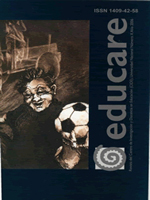Propuesta metodológica para fomentar la igualdad de género en el aula escolar
DOI:
https://doi.org/10.15359/ree.10-1.6Keywords:
gender, equity, school, societyAbstract
This work is named methodological proposed to fortify the equality of kind in the school classroom, with children and girls of the primary school. As teacher, I have wanted to contribute through my lived experiencies, some strategies that they allow to foment in ours students a more just and egalitarian education.
Knowledgeable, of the different sexist practices and stereotypes highly established in our society, that hinder some women manage to be unfold according to their own capacities and potentials, bordering them to comply with the role that the society assigns them according to their sex, it is that I desire to put an propose in order the students live in the classroom a real equality. Being the school one of the more important agents of socialization, and where it is necessary to propitiate the change in favour of an education of equity.
The work to level of classroom will allow diminishing the discriminatory schemes and will be a great achievement in benefit of the future generations. The interrelationships that live in that small culture called classroom, are very wealth-producing and varied, for which it is a favourable place to initiate changes in matter of kind.
References
Abarca, S. (1991) Métodos cualitativos en investigación sobre la ensenanza. s.o.d.
Aguilar, L., Facio, A. y otros. (1995) ¿Feminismo en Costa Rica? (Testimonios, reflexiones,
ensayos). San José, Costa Rica.
Calvo, Y. ( 1990) A la mujer por la palabra. Heredia, Costa Rica.
Calvo, Y. (1984) Literatura, mujer y sexismo. San José, Costa Rica.
Contreras, l. (1992) Investigación etnográfica en el marco de la investigación cualitativa en educación. S.O.D.
González, M. (1992) El sexismo en educación: discriminación cotidiana. San José, Costa Rica.
Martínez, M. (1991) La investigación cualitativa: estrategias en educación. Caracas, Venezuela.
Ministerio de Educación Pública. Centro Nacional de Didáctica. (1995) Yo, mi familia, mi comunidad: Manual de apoyo didáctico. Tercer año. Primer ciclo de la EGB.
Ministerio de Educación Pública. Centro Nacional de Didáctica. (1998) Formación ambiental demográfica, familiar y personal; manual de apoyo didáctico. Primer y segundo ciclo de la EGB.
Ministerio de Justicia y Gracia. ( 1997) Ley de la promoción de la igualdad real de la mujer. San José, Costa Rica.
Ministerio de Justicia y Gracia (1987) ¿ Qué es la defensoría de la infancia? San José, Costa Rica.
Montero, M. (1983) La investigación cualitativa en el campo de la educación. San José, Costa Rica.
Patrick, S. (1988) Introducción a la investigación y a la evaluación educativa. Instituto de investigaciones-y mejoramiento educativo. Universidad de San Carlos de Guatemala.
Programa de estudios interdisciplinario de estudios de género de Nicaragua. ( 1987) Guía didáctica. Nicaragua.
Salas, F. (1997) La investigación educativa: compartiendo ideas fundamentales. Centro de Investigación y Docencia en Educación. Universidad Nacional.
Downloads
Published
How to Cite
Issue
Section
License
1. In case the submitted paper is accepted for publication, the author(s) FREELY, COSTLESS, EXCLUSIVELY AND FOR AN INDEFINITE TERM transfer copyrights and patrimonial rights to Universidad Nacional (UNA, Costa Rica). For more details check the Originality Statement and Copyright Transfer Agreement
2. REUTILIZATION RIGHTS: UNA authorizes authors to use, for any purpose (among them selfarchiving or autoarchiving) and to publish in the Internet in any electronic site, the paper´'s final version, both approved and published (post print), as long as it is done with a non commercial purpose, does not generate derivates without previous consentment and recognizes both publisher's name and authorship.
3. The submission and possible publication of the paper in the Educare Electronic Journal is ruled by the Journal’s editorial policies, the institutional rules of Universidad Nacional and the laws of the Republic of Costa Rica. Additionally, any possible difference of opinion or future dispute shall be settled in accordance with the mechanisms of Alternative Dispute Resolution and the Costa Rican Jurisdiction.
4. In all cases, it is understood that the opinions issued are those of the authors and do not necessarily reflect the position and opinion of Educare, CIDE or Universidad Nacional, Costa Rica. It is also understood that, in the exercise of academic freedom, the authors have carried out a rogorous scientific-academic process of research, reflection and argumentation thar lays within the thematic scope of interest of the Journal.
5. The papers published by Educare Electronic Journal use a Creative Commons License:














 The articles published by Educare Electronic Journal can be shared with a Creative Commons License:
The articles published by Educare Electronic Journal can be shared with a Creative Commons License: 



